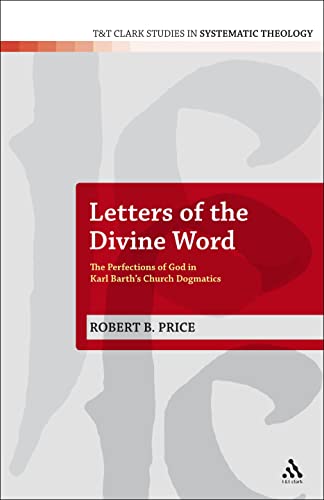Letters of the Divine Word: The Perfections of God in Karl Barth’s Church Dogmatics
Written by Robert B. Price Reviewed By Jordan P. BarrettThe divine attributes have a longstanding history throughout the Christian tradition. While there has been a supposed recovery of trinitarian theology, the divine attributes have often been neglected in contemporary discussions regarding the doctrine of God. Furthermore, despite the growing interest in the theology of Karl Barth, his treatment of the perfections of God in Church Dogmatics II/1 has received little attention. Letters of the Divine Word is a revised dissertation by Robert Price, Assistant Professor of Theology at Talbot School of Theology, and seeks to fill the gap in both studies on Karl Barth and the perfections of God in modern theology.
It should be made clear from the beginning that this is not primarily a constructive work on the divine attributes. Rather, it is “an exercise in the genre of commentary” and therefore is “an attempt at a close reading and analysis of a single text, rather than an endeavor to argue a specific thesis” (p. 1). Most of the book presents and interprets Barth’s argument, and therefore Price acts as a tour guide through the twists and turns of CD II/1, clarifying the terrain and pointing out key issues that one might easily bypass or misunderstand. Therefore, although this work is a running commentary on CD II/1, Price consistently engages the best of recent scholarship in order to clarify Barth’s views and explain central concepts and categories. The book is divided into five chapters. The first four chapters focus on the four paragraphs that make up CD II/1:
- Chapter 1: The Being of God as the One Who Loves in Freedom (§28)
- Chapter 2: The Perfections of God (§29)
- Chapter 3: The Perfections of the Divine Loving (§30)
- Chapter 4: The Perfections of Divine Freedom (§31)
- Chapter five summarizes the theological decisions that shaped Barth’s account and looks at the possibilities for future research.
“The being of God as the one who loves in freedom” is one of the key phrases for Barth that is shorthand for his entire doctrine of the divine perfections. Barth treats the divine loving first, pairing three groups of perfections: grace and holiness; mercy and righteousness; patience and wisdom. The divine freedom includes unity and omnipresence, constancy (i.e., immutability) and omnipotence, and eternity and glory.
This arrangement is out of “dogmatic necessity” and does not imply any kind of “competitive relationship” between love and freedom or their respective attributes. Rather, for Barth this follows the logical order of divine revelation where we first learn of divine love and then of divine freedom. The reciprocal and dialectical relationship between the two means that each is necessary and fulfills the other even though they are distinguished. In other words, God’s freedom and loving are equally central to God’s identity. However, as Price notes, interpreters often isolate or privilege one or the other (e.g., “McCormack’s proposal might be said to represent an overemphasis on the divine loving” [pp. 10–11]), but this is not what Barth is proposing. Furthermore, in speaking of the divine loving and freedom, Barth “is appealing to trinitarian categories” (p. 13) where the perfections describe the common essence of Father, Son, and Holy Spirit (cf. pp. 53, 177). A final important aspect of CD II/1 is “Barth’s relentless campaign against nominalism” (p. 191). This move owes its origins to Barth’s view of the Trinity where God’s revelation of himself is identical with his immanent life as Father, Son, and Holy Spirit. There is not a different “God behind God” than the one we see revealed in Jesus Christ.
Price’s conclusion does not offer a substantial assessment of Barth’s view, but this was not his aim. Rather, “in light of much misinterpretation [and] necessarily preliminary to any such assessment,” Price presents “the clarification of precisely what Barth does and does not affirm” (p. 185). Three crucial theological decisions stand out: “(1) to ground everything [Barth] says about the perfections exclusively in God himself, (2) to expound the perfections explicitly as those of the very essence of God, and (3) not to abstract those perfections from their implications for the Christian life” (p. 186). These decisions are “the keys” to Barth’s account and are consistently fleshed out throughout Price’s work with great care and precision.
Overall, Price presents a clear and compelling account of Barth’s view of the divine perfections. Readers less familiar with Barth should still find Price to be a careful guide through CD II/1. This work is neither a dry nor boring theological commentary, nor does Price become distracted with current scholarship or narrow conversations within Barth studies. Therefore, Price should be commended for producing a work with great wisdom and balance that contributes not only to Barth studies, but also to the small but growing discussion on the divine attributes. Pokrifka’s recent work on Barth ( Redescribing God [Pickwick, 2010)]) is a helpful supplemental text, but Price’s work stands out as the best book available on the perfections of God in Barth.
Jordan P. Barrett
Jordan P. Barrett
Wheaton College
Wheaton, Illinois USA
Other Articles in this Issue
The gist of this new book by Peter Enns is that evangelicals should revise their expectations of Genesis and Paul—with reference to Adam and the fall—in order to relieve perceived tensions between Christianity and evolution...
In June 2011, the Presbyterian Church in America (PCA) passed an overture entitled, “A Call to Faithful Witness...
I was very grateful to David for sending me a copy of his essay before publication...
Is it stating the obvious to say that a children’s bible is not a Bible? Perhaps...
Sacramental Supersessionism Revisited: A Response to Martin Salter on the Relationship between Circumcision and Baptism
by David GibsonMartin Salter has recently argued that Reformed paedobaptists are mistaken in citing Col 2:11–12 ‘as evidence that baptism replaces circumcision as the covenant sign signifying the same realities...






